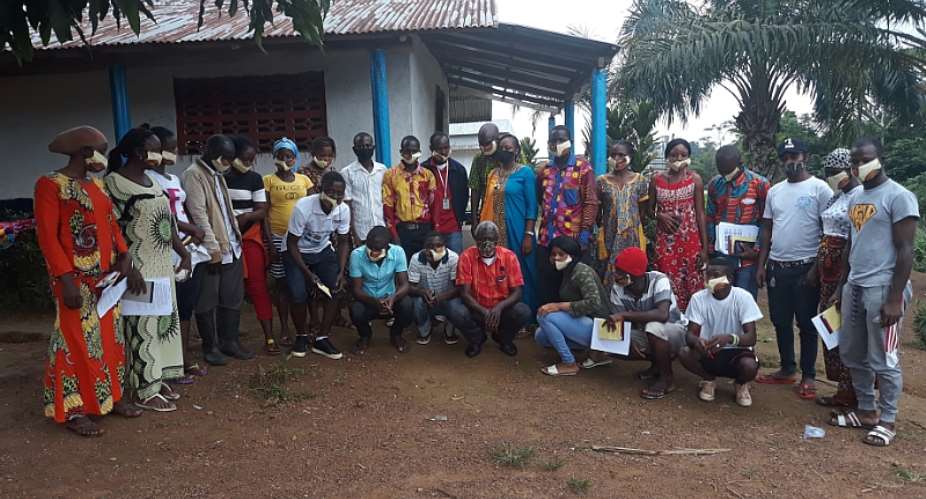Like many Liberians in the informal sector, some charcoal producers (burners) and sellers know little or nothing about the difference between mere sellers and marketers. They burn charcoal without knowing their targeted customers, sometimes leading to the depreciation in quality of the coal while others are controlled by customers that buy at low prices. At times, some lose the entire production. Similarly, they lack knowledge in natural resources and environmental management.
As a result, charcoal burners’ incomes are far less than the energy and resources used in the process. It also leads them to using large forest area to get wood; not taking into consideration the environmental degradation that goes with this traditional charcoal production.
To address these factors in order to help the charcoal burners maximize profits from the forest and sustainably manage the forest, the National Charcoal Union of Liberia (NACUL) has trained 30 charcoal producers in Bomi County in market analysis and development as well as latest technologies.
Held August 10-11, 2020 in Klay, Bomi County, the EU/FLEGT program-sponsored training brought together leaders and members of the three charcoal burner groups in Bomi County. They include: Suehn/Mecca District Charcoal Producers Association, Klay District Charcoal Producers Association and Senjeh District Charcoal Producers Association.
A female trainer, Ms. Christine E. Harmon, facilitated the workshop, drilling participants through marketing and analysis development plans.
Though participants were mainly charcoal burners, the training was meant to expose them to the general market idea that could explore other business opportunities for them.
Ms. Harmon, in a simple interactive discussion, lectured the trainees on the four major market and analysis development approaches, including (a) assessing existing situations, (b) carrying out survey in order to select products, (c) preparing an enterprise development plan and (d) supporting the start-up phase.
The training was also practical, with participants broken into groups to select potential products among listed but local resources of their forest, after identifying matched and existing situations and possible solutions in a local understanding.
On the overall, the charcoal burners were trained for a progressive marketing to be the hallmark of their business approaches as well as sustainable production and forest management. All geared toward benefiting from the forest and sustainably managing it.
At the end of the training, participants commended NACUL for the training and appealed for more training opportunities because they are being enlightened on what they did not know before.
Speaking on behalf the participants, Madam Fatu Carter and Mr. Jomah M. Goll of Suehn/Mecca District Charcoal Producers Association, Madam Maima Washington of Senjeh District Charcoal Producers Association and Mr. J. Alexander Tokpa of Klay District Charcoal Producers Association, said they had considered charcoal burning as a mere venture, but NACUL continues to educate them on the importance of charcoal in Liberia, how to sustainably produce it and manage the forest using available resources and technologies.
“Today’s training has given us more knowledge on many things surrounding charcoal burning to improve our living. We want to thank NACUL for the opportunity and appeal for more training programs,” Ms. Fatu Carter of Suehn/Mecca District Charcoal Producers Association said.
For his part, NACUL’s President, Mr. Richard T. A. Dorbor, praised participants for attending and challenged them to put into practice what they have acquired.
Dorbor told the local charcoal groups to be more proactive in their activities if they must attract more business and training opportunities in the county. He told the associations to use their legal status to expand their activities, urging them to work together as a group.
In terms of marketing, Dorbor told the charcoal burners to produce quality product in order to attract more customers. “Nobody will buy ugly coal from you and come back. Produce good coal; that’s the only way you can get more customers,” he stated.
Dorbor used the occasion to commend Ms. Harmon for facilitating the training and affirmed NACUL’s commitment in helping the associations turn the training into legalities.
The NACUL boss also lauded sponsors of its activities in Liberia, saying, “NACUL remains grateful and will continue to improve the sector as well as assist in the sustainable forest management project.”
The Bomi County’s training is in continuation of NACUL’s training opportunities to its network organizations in counties of its operation, with plans extend to other counties.
Meanwhile, Dorbor is calling on the government, other local and international NGOs, institutions and individuals to pay more attention in the sector since the majority still depends on charcoal energy for cooking and other essential activities.





 Lay KPMG audit report on SML-GRA contract before Parliament – Isaac Adongo tells...
Lay KPMG audit report on SML-GRA contract before Parliament – Isaac Adongo tells...
 Supervisor remanded for stabbing businessman with broken bottle and screwdriver
Supervisor remanded for stabbing businessman with broken bottle and screwdriver
 NDC watching EC and NPP closely on Returning Officer recruitment — Omane Boamah
NDC watching EC and NPP closely on Returning Officer recruitment — Omane Boamah
 Your decision to contest for president again is pathetic – Annoh-Dompreh blasts ...
Your decision to contest for president again is pathetic – Annoh-Dompreh blasts ...
 Election 2024: Security agencies ready to keep peace and secure the country — IG...
Election 2024: Security agencies ready to keep peace and secure the country — IG...
 People no longer place value in public basic schools; new uniforms, painting wil...
People no longer place value in public basic schools; new uniforms, painting wil...
 'Comedian' Paul Adom Otchere needs help – Sulemana Braimah
'Comedian' Paul Adom Otchere needs help – Sulemana Braimah
 Ejisu by-election: Only 33% of voters can be swayed by inducement — Global InfoA...
Ejisu by-election: Only 33% of voters can be swayed by inducement — Global InfoA...
 Minority will expose the beneficial owners of SML, recover funds paid to company...
Minority will expose the beneficial owners of SML, recover funds paid to company...
 Prof. Opoku-Agyemang has ‘decapitated’ the NPP’s strategies; don’t take them ser...
Prof. Opoku-Agyemang has ‘decapitated’ the NPP’s strategies; don’t take them ser...
